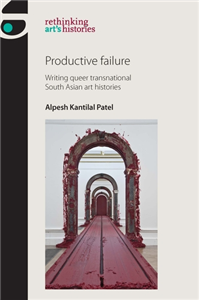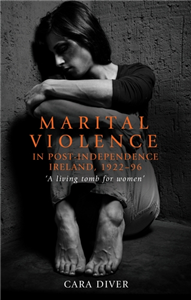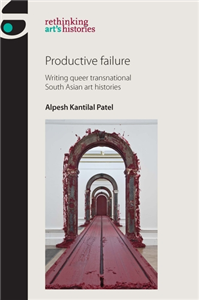Your Search Results
-
Promoted Content
-
Promoted ContentPeace studies & conflict resolutionJuly 2013
The Israeli response to Jewish extremism and violence
by Ami Pedahzur
-
 Trusted Partner
Peace studies & conflict resolutionJuly 2012
Trusted Partner
Peace studies & conflict resolutionJuly 2012The Israeli response to Jewish extremism and violence
by Pedahzur
-
 Trusted Partner
The ArtsJune 2017
Trusted Partner
The ArtsJune 2017Productive failure
Writing queer transnational South Asian art histories
by Amelia Jones, Marsha Meskimmon, Alpesh Kantilal Patel
This title sets out to write new transnational South Asian art histories - to make visible histories of artworks that remain marginalised within the discipline of art history. However, this is done through a deliberate 'productive failure' - specifically, by not upholding the strictly genealogical approach that is regularly assumed for South Asian art histories. For instance, one chapter explores the abstract work of Cy Twombly and Natvar Bhavsar. The author also examines 'whiteness', the invisible ground upon which racialized art histories often pivot, as a fraught yet productive site for writing art history. This book also provides original commentary on how queer theory can deconstruct and provide new approaches for writing art history. Overall, this title provides methods for generating art history that acknowledge the complex web of factors within which art history is produced and the different forms of knowledge-production we might count as art history.
-
 Trusted Partner
The ArtsJune 2017
Trusted Partner
The ArtsJune 2017Productive failure
Writing queer transnational South Asian art histories
by Amelia Jones, Marsha Meskimmon, Alpesh Kantilal Patel
This title sets out to write new transnational South Asian art histories - to make visible histories of artworks that remain marginalised within the discipline of art history. However, this is done through a deliberate 'productive failure' - specifically, by not upholding the strictly genealogical approach that is regularly assumed for South Asian art histories. For instance, one chapter explores the abstract work of Cy Twombly and Natvar Bhavsar. The author also examines 'whiteness', the invisible ground upon which racialized art histories often pivot, as a fraught yet productive site for writing art history. This book also provides original commentary on how queer theory can deconstruct and provide new approaches for writing art history. Overall, this title provides methods for generating art history that acknowledge the complex web of factors within which art history is produced and the different forms of knowledge-production we might count as art history.
-
 Trusted Partner
Business, Economics & LawJanuary 2018
Trusted Partner
Business, Economics & LawJanuary 2018Law and violence
Christoph Menke in dialogue
by Christoph Menke, David Owen
Christoph Menke is a third-generation Frankfurt School theorist, and widely acknowledged as one of the most interesting philosophers working in Germany today. His work builds on Adorno and Horkheimer to show how the repressive features contained in the very promises of equality, autonomy and freedom from domination inevitably structure contemporary societies. But Menke argues that reflexive awareness of such antinomies can counter the hold they have on us. His lead essay focuses on the fundamental question for legal and political philosophy: the relationship between law and violence. The first part of the essay shows why and in what precise sense the law is irreducibly violent; the second part establishes the possibility and the possible form of the law becoming self-reflectively aware of its own violence. The volume contains responses to Menke's essay by a variety of influential interlocutors and concludes with Menke's reply to his critics.
-
 Trusted Partner
Business, Economics & LawJanuary 2018
Trusted Partner
Business, Economics & LawJanuary 2018Law and violence
Christoph Menke in dialogue
by Christoph Menke, David Owen
Christoph Menke is a third-generation Frankfurt School theorist, and widely acknowledged as one of the most interesting philosophers working in Germany today. His work builds on Adorno and Horkheimer to show how the repressive features contained in the very promises of equality, autonomy and freedom from domination inevitably structure contemporary societies. But Menke argues that reflexive awareness of such antinomies can counter the hold they have on us. His lead essay focuses on the fundamental question for legal and political philosophy: the relationship between law and violence. The first part of the essay shows why and in what precise sense the law is irreducibly violent; the second part establishes the possibility and the possible form of the law becoming self-reflectively aware of its own violence. The volume contains responses to Menke's essay by a variety of influential interlocutors and concludes with Menke's reply to his critics.
-
 Trusted Partner
Business, Economics & LawJanuary 2018
Trusted Partner
Business, Economics & LawJanuary 2018Law and violence
Christoph Menke in dialogue
by Christoph Menke, David Owen
Christoph Menke is a third-generation Frankfurt School theorist, and widely acknowledged as one of the most interesting philosophers working in Germany today. His work builds on Adorno and Horkheimer to show how the repressive features contained in the very promises of equality, autonomy and freedom from domination inevitably structure contemporary societies. But Menke argues that reflexive awareness of such antinomies can counter the hold they have on us. His lead essay focuses on the fundamental question for legal and political philosophy: the relationship between law and violence. The first part of the essay shows why and in what precise sense the law is irreducibly violent; the second part establishes the possibility and the possible form of the law becoming self-reflectively aware of its own violence. The volume contains responses to Menke's essay by a variety of influential interlocutors and concludes with Menke's reply to his critics.
-
 Trusted Partner
The ArtsJune 2017
Trusted Partner
The ArtsJune 2017Productive failure
Writing queer transnational South Asian art histories
by Amelia Jones, Marsha Meskimmon, Alpesh Kantilal Patel
This title sets out to write new transnational South Asian art histories - to make visible histories of artworks that remain marginalised within the discipline of art history. However, this is done through a deliberate 'productive failure' - specifically, by not upholding the strictly genealogical approach that is regularly assumed for South Asian art histories. For instance, one chapter explores the abstract work of Cy Twombly and Natvar Bhavsar. The author also examines 'whiteness', the invisible ground upon which racialized art histories often pivot, as a fraught yet productive site for writing art history. This book also provides original commentary on how queer theory can deconstruct and provide new approaches for writing art history. Overall, this title provides methods for generating art history that acknowledge the complex web of factors within which art history is produced and the different forms of knowledge-production we might count as art history.
-
 Trusted Partner
Humanities & Social SciencesMay 2019
Trusted Partner
Humanities & Social SciencesMay 2019Marital violence in post-independence Ireland, 1922–96
'A living tomb for women'
by Cara Diver
Marital violence in post-independence Ireland, 1922-96 represents the first comprehensive history of marital violence in modern Ireland, from the founding of the Irish Free State in 1922 to the passage of the Domestic Violence Act and the legalisation of divorce in 1996. Based upon extensive research of under-used court records, this groundbreaking study sheds light on the attitudes, practices, and laws surrounding marital violence in twentieth-century Ireland. While many men beat their wives with impunity throughout this period, victims of marital violence had little refuge for at least fifty years after independence. During a time when most abused wives remained locked in violent marriages, this book explores the ways in which men, women, and children responded to marital violence. It raises important questions about women's status within marriage and society, the nature of family life, and the changing ideals and lived realities of the modern marital experience in Ireland.
-
 Trusted Partner
Humanities & Social SciencesJanuary 2019
Trusted Partner
Humanities & Social SciencesJanuary 2019Unfinished business
The politics of 'dissident' Irish republicanism
by Marisa McGlinchey
This book discusses the development of 'dissident' Irish republicanism and considers its impact on politics throughout Ireland since the 1980s. Based on a series of interviews with over ninety radical republican activists from the wide range of groups and currents which make up 'dissident' republicanism, the book provides an up-to-date assessment of the political significance and potential of the groups who continue to oppose the peace process and the Good Friday Agreement. It shows that the 'dissidents' are much more than traditionalist irreconcilables left behind by Gerry Adams' entry into the mainstream. Instead the book suggests that the dynamics and trajectory of 'dissident' republicanism are shaped more by contemporary forces than historical tradition and that by understanding the "dissidents" we can better understand the emerging forms of political challenge in an age of austerity and increasing political instability internationally.
-
 Trusted Partner
Humanities & Social SciencesJanuary 2018
Trusted Partner
Humanities & Social SciencesJanuary 2018Law and violence
Christoph Menke in dialogue
by Christoph Menke, David Owen
Christoph Menke is a third-generation Frankfurt School theorist, and widely acknowledged as one of the most interesting philosophers in Germany today. His lead essay focuses on the fundamental question for legal and political philosophy: the relationship between law and violence. The first part of the essay shows why and in what precise sense the law is irreducibly violent; the second part establishes the possibility of the law becoming self-reflectively aware of its own violence. The volume contains responses by María del Rosario Acosta López, Daniel Loick, Alessandro Ferrara, Ben Morgan, Andreas Fischer-Lescano and Alexander García Düttmann. It concludes with Menke's reply to his critics.
-
 Trusted Partner
Humanities & Social SciencesMay 2019
Trusted Partner
Humanities & Social SciencesMay 2019Marital violence in post-independence Ireland, 1922–96
'A living tomb for women'
by Cara Diver
Marital violence in post-independence Ireland, 1922-96 represents the first comprehensive history of marital violence in modern Ireland, from the founding of the Irish Free State in 1922 to the passage of the Domestic Violence Act and the legalisation of divorce in 1996. Based upon extensive research of under-used court records, this groundbreaking study sheds light on the attitudes, practices, and laws surrounding marital violence in twentieth-century Ireland. While many men beat their wives with impunity throughout this period, victims of marital violence had little refuge for at least fifty years after independence. During a time when most abused wives remained locked in violent marriages, this book explores the ways in which men, women, and children responded to marital violence. It raises important questions about women's status within marriage and society, the nature of family life, and the changing ideals and lived realities of the modern marital experience in Ireland.
-
 Trusted Partner
Humanities & Social SciencesJanuary 2019
Trusted Partner
Humanities & Social SciencesJanuary 2019Unfinished business
The politics of 'dissident' Irish republicanism
by Marisa McGlinchey
This book discusses the development of 'dissident' Irish republicanism and considers its impact on politics throughout Ireland since the 1980s. Based on a series of interviews with over ninety radical republican activists from the wide range of groups and currents which make up 'dissident' republicanism, the book provides an up-to-date assessment of the political significance and potential of the groups who continue to oppose the peace process and the Good Friday Agreement. It shows that the 'dissidents' are much more than traditionalist irreconcilables left behind by Gerry Adams' entry into the mainstream. Instead the book suggests that the dynamics and trajectory of 'dissident' republicanism are shaped more by contemporary forces than historical tradition and that by understanding the "dissidents" we can better understand the emerging forms of political challenge in an age of austerity and increasing political instability internationally.
-
 Trusted Partner
Humanities & Social SciencesJanuary 2019
Trusted Partner
Humanities & Social SciencesJanuary 2019Unfinished business
The politics of 'dissident' Irish republicanism
by Marisa McGlinchey
This book discusses the development of 'dissident' Irish republicanism and considers its impact on politics throughout Ireland since the 1980s. Based on a series of interviews with over ninety radical republican activists from the wide range of groups and currents which make up 'dissident' republicanism, the book provides an up-to-date assessment of the political significance and potential of the groups who continue to oppose the peace process and the Good Friday Agreement. It shows that the 'dissidents' are much more than traditionalist irreconcilables left behind by Gerry Adams' entry into the mainstream. Instead the book suggests that the dynamics and trajectory of 'dissident' republicanism are shaped more by contemporary forces than historical tradition and that by understanding the "dissidents" we can better understand the emerging forms of political challenge in an age of austerity and increasing political instability internationally.
-
 Trusted Partner
Humanities & Social SciencesJanuary 2019
Trusted Partner
Humanities & Social SciencesJanuary 2019Unfinished business
The politics of 'dissident' Irish republicanism
by Marisa McGlinchey
This book discusses the development of 'dissident' Irish republicanism and considers its impact on politics throughout Ireland since the 1980s. Based on a series of interviews with over ninety radical republican activists from the wide range of groups and currents which make up 'dissident' republicanism, the book provides an up-to-date assessment of the political significance and potential of the groups who continue to oppose the peace process and the Good Friday Agreement. It shows that the 'dissidents' are much more than traditionalist irreconcilables left behind by Gerry Adams' entry into the mainstream. Instead the book suggests that the dynamics and trajectory of 'dissident' republicanism are shaped more by contemporary forces than historical tradition and that by understanding the "dissidents" we can better understand the emerging forms of political challenge in an age of austerity and increasing political instability internationally.
-
 Trusted Partner
Humanities & Social SciencesMay 2019
Trusted Partner
Humanities & Social SciencesMay 2019Marital violence in post-independence Ireland, 1922–96
'A living tomb for women'
by Cara Diver
Marital violence in post-independence Ireland, 1922-96 represents the first comprehensive history of marital violence in modern Ireland, from the founding of the Irish Free State in 1922 to the passage of the Domestic Violence Act and the legalisation of divorce in 1996. Based upon extensive research of under-used court records, this groundbreaking study sheds light on the attitudes, practices, and laws surrounding marital violence in twentieth-century Ireland. While many men beat their wives with impunity throughout this period, victims of marital violence had little refuge for at least fifty years after independence. During a time when most abused wives remained locked in violent marriages, this book explores the ways in which men, women, and children responded to marital violence. It raises important questions about women's status within marriage and society, the nature of family life, and the changing ideals and lived realities of the modern marital experience in Ireland.
-
 Trusted Partner
The ArtsJune 2018
Trusted Partner
The ArtsJune 2018Productive failure
Writing queer transnational South Asian art histories
by Amelia Jones, Marsha Meskimmon, Alpesh Kantilal Patel
This title sets out to write new transnational South Asian art histories - to make visible histories of artworks that remain marginalised within the discipline of art history. However, this is done through a deliberate 'productive failure' - specifically, by not upholding the strictly genealogical approach that is regularly assumed for South Asian art histories. For instance, one chapter explores the abstract work of Cy Twombly and Natvar Bhavsar. The author examines 'whiteness', the invisible ground upon which racialized art histories often pivot, as a fraught yet productive site for writing art history. This book also provides original commentary on how queer theory can deconstruct and provide new approaches for writing art history. Overall, this title provides methods for generating art history that acknowledge the complex web of factors within which art history is produced and the different forms of knowledge-production we might count as art history.
-
 Trusted Partner
Teaching, Language & ReferenceJuly 2018
Trusted Partner
Teaching, Language & ReferenceJuly 2018The Israeli response to Jewish extremism and violence
by Ami Pedahzur, Peter Lawler, Emmanuel Pierre Guittet, Caroline Wilding
-
 Trusted Partner
Humanities & Social SciencesJanuary 2020
Trusted Partner
Humanities & Social SciencesJanuary 2020Marital violence in post-independence Ireland, 1922–96
'A living tomb for women'
by Cara Diver
Marital violence in post-independence Ireland, 1922-96 represents the first comprehensive history of marital violence in modern Ireland, from the founding of the Irish Free State in 1922 to the passage of the Domestic Violence Act and the legalisation of divorce in 1996. Based upon extensive research of under-used court records, this groundbreaking study sheds light on the attitudes, practices, and laws surrounding marital violence in twentieth-century Ireland. While many men beat their wives with impunity throughout this period, victims of marital violence had little refuge for at least fifty years after independence. During a time when most abused wives remained locked in violent marriages, this book explores the ways in which men, women, and children responded to marital violence. It raises important questions about women's status within marriage and society, the nature of family life, and the changing ideals and lived realities of the modern marital experience in Ireland.























